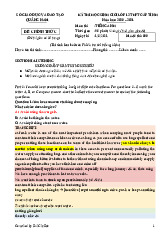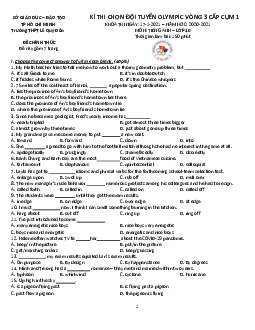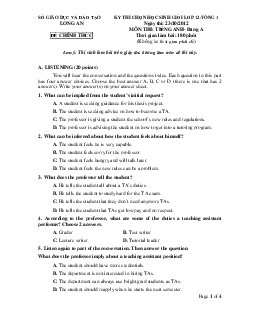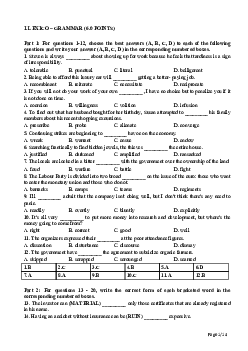












Preview text:
SỞ GIÁO DỤC VÀ ĐÀO TẠO KỲ THI HỌC SINH GIỎI VĂN HOÁ LỚP 12 THPT QUẢNG TRỊ
Khóa ngày 06 tháng 10 năm 2020 Môn thi: TIẾNG ANH ĐỀ THI CHÍNH THỨC
Thời gian làm bài: 180 phút (không kể thời gian giao đề)
(Đề thi này gồm 11 trang)
Họ và tên học sinh: S ố b áo d anh Ngày sinh: Phòng thi số: Hội đồng thi: Họ, tên và chữ ký Họ, tên và chữ ký M ã p h ách GIÁM THỊ 1 GIÁM THỊ 2
(Thí sinh không viết vào ô này)
HƯỚNG DẪN THÍ SINH L ÀM BÀI:
● Thí sinh làm toàn bộ bài thi trên đề thi theo yêu cầu của từng phần. Thí sinh
phải viết câu trả lời vào phần trả lời được cho sẵn ở mỗi phần (Your answers
here). Trái với điều này, phần bài làm của thí sinh sẽ không được chấm điểm.
● Đề thi gồm có 11 trang (không kể trang phách). Thí sinh phải kiểm tra số tờ đề thi trước khi làm bài.
● Phần NGHE, mỗi Part thí sinh được nghe 2 lần.
● Thí sinh không được ký tên hoặc dùng bất cứ dấu hiệu gì để đánh dấu bài thi ngoài
việc làm bài theo yêu cầu của đề ra. Không được viết bằng mực đỏ, bút chì,
không viết hai thứ mực trên tờ giấy làm bài. Phần viết hỏng, ngoài cách dùng
thước để gạch chéo, không được tẩy xóa bằng bất kỳ cách gì khác (kể cả bút xóa
màu trắng). Trái với điều này bài thi sẽ bị loại.
● Thí sinh nên làm nháp trước rồi ghi chép cẩn thận vào phần bài làm trên đề thi.
Giám thị sẽ không phát giấy làm bài thay thế đề và giấy làm bài do thí sinh làm hỏng.
● Giám thị không giải thích gì thêm về đề thi.
_______________________________ HSGVH12- 2020 Page0/11
PHẦN ĐỀ VÀ BÀI LÀM CỦA THÍ SINH ĐIỂM
Họ, tên và chữ ký Mã phách GIÁM KHẢO
Do chủ tịch HĐCT ghi Bằng số Bằng chữ
1………………………………
2…………………………..…..
SECTION I: LISTENING COMPREHENSION (5 POINTS)
Part 1: Listen to a conversation and complete the form below with NO MORE THAN TWO
WORDS and/or A NUMBER for each answer. Write your answers in the corresponding numbered boxes.
Student Union Registration Form Name : Stefan Unger
Degree programme: (1) ______________________
Department : (2) ______________________
Leisure activities: (3) ______________________
Language(s) (apart from English): (4) ______________________
Type of accommodation: (5) ______________________ Contact number: 0295069003
Part 2: Listen to part of a radio programme. Decide which of the sentences are true (T), and
which are false (F) according to the recording. Write your answers in the corresponding numbered boxes.
1. Everybody in the Outback has at least a telephone to keep in touch with the world.
2. In an emergency, doctors use jeeps to get to the patient.
3. It doesn’t take the doctors more than ninety minutes to get to any place in the Outback.
4. Children living in the Outback do not go to school at all.
5. The children in the Outback can communicate with their teachers by two- way radio and post.
Part 3: Listen to an interview with a woman called Amy Rowntree, who works as a fashion
designer and choose the correct option (A, B, or C). Write your answers in the corresponding numbered boxes.
1. Amy decided to become a fashion designer while ________. A. she was working in a shop B. she was still at school
C. she was helping run a fashion show
2. Amy says the most important skill for a designer is ________.
A. remaining patient in difficult situations
B. understanding how clothes are made
C. knowing about different materials
3. What does Amy particularly like about her work?
A. being able to sell her designs B. having her name recognised
C. seeing her clothes on display
4. What helps Amy find new ideas for designs? A. going to visit museums
B. looking at photos of clothes C. seeing things around her HSGVH12- 2020 Page1/11
5. What project is Amy working on at the moment? A. a fashion show in New York
B. a collection of clothes for a film
C. a new range for a London store
Part 4: Listen to a lecture about student orientation and complete the table below.
Write NO MORE THAN THREE WORDS for each answer. Write your answers in the
corresponding numbered boxes. Orientation Schedule Monday Part I: Campus Tour
meet at door of (1) __________________ at 9 a.m.
visit (2) ___________________ in the afternoon. Tuesday
Computer Centre: to get (3) ____________________
(4) ____________________: to apply for membership Wednesday Part II: Course
meet at Auditorium in the west campus (5) Arrangement _______________ course requirement
(6) ___________________ and optional courses assessments:
(7) ___________________ 80% assignment
(8) ___________________ group work exam: open-book Thursday go to department office to:
get a (9) ____________________ hand in optional course form Part III: Welcome Party Friday Time: 5 p.m.
Venue: (10) _____________________ on the third floor Your answers here Part 1: 1. 2. 3. 4. 5. Part 2: 1. 2. 3. 4. 5. Part 3: 1. 2. 3. 4. 5. Part 4: 1. 2. 3. 4. 5. 6. HSGVH12- 2020 Page2/11 7. 8. 9. 10.
SECTION II: LEXICAL & GRAMMAR (3.5 POINTS)
Part 1: Choose the best answer (A, B, C, or D) to each of the following questions and write
your answers in the corresponding numbered boxes.
1. If Jack had done his homework last night, he ______ a bad mark now.
A. wouldn’t get B. won’t get C. wouldn’t have got D. would get
2. It is necessary that Dave _______ to see the doctor right now. A. come B. comes C. to come D. is coming
3. Everyone hardly finds out a quiet place here, ______? A. don’t they B. do they C. does she D. doesn’t she
4. Even when John was angry, he would never _______ to violence. A. resolve B. recourse C. exert D. resort
5. Tom’s parents were really pleased when they read his school ______. A. report B. paper C. diploma D. account
6. Susan says that she feels less nervous since she ______ on tea and coffee. A. stopped off B. turned back C. cut out D. cut down
7. Mike: What a nice hat you have on! ~ Paul: ______ A. You’re welcome. B. Yes, you like it? C. Oh, you must be kidding.
D. Thanks. I bought it at Kelly’s.
8. This room is decorated in a _____ combination of colours. A. delicious B. sweet C. tasteful D. tasty
9. My decision to drop out of university after a year is the one I now ______ regret. A. keenly B. painfully C. heavily D. harshly
10. It was decided that the cost of the project would be ______ and so it was abandoned. A. restrictive B. prohibitive C. repressive D. exclusive
Your answers here 1. 2. 3. 4. 5. 6. 7. 8. 9. 10.
Part 2: Identify 10 mistakes in the following passage in any order and correct them. (0) in Line
1 has been done as an example. Write your answers in the corresponding numbered boxes. Line 1
An endangered species is a population of an organism who is at risk of Line 2
becoming extinct because it is either few in numbers, or threatened by Line 3
changed environmental or predation parameters. An endangered species Line 4
is usually a taxonomic species, but may be other evolutionary significant Line 5
unit, The World Conservation Union (IPCN) has calculated the percent Line 6
of endangered species as 40 percent of all organisms based at the Line 7
samples of species that have been evaluating through 2006. Many Line 8
nations have laws offering protection to this species: for example, Line 9
forbidding hunting, restricting land development or create reserves. Only Line 10
a few of the many species at risk of extinct actually make it to the lists Line 11
and obtain legal protection. Much more species become extinct, or Line 12
potential will become extinct, without gaining public notice.
Your answers here HSGVH12- 2020 Page3/11 Line Mistake Correction Line Mistake Correction Line 1 (0) who which 1. 6. 2. 7. 3. 8. 4. 9. 5. 10.
Part 3: Complete each of the following sentences with one appropriate preposition/particle.
Write your answers in the corresponding numbered boxes.
1. Fred is really mature. He is completely independent ____________ his parents.
2. Make ____________ your mind now or we will go without you.
3. Kelly must be responsible ____________ the director for what she has just said.
4. Nowadays many people have been suffering ____________ cancer.
5. He really gets ____________ my nerves. He never stops complaining.
6. No student can answer the professor’s question because it is too hard to take ____________.
7. Sofia worked very hard and her success went ____________ my expectation.
Your answers here 1. 2. 3. 4. 5. 6. 7.
Part 4: Supply the correct form of the words given in CAPITALS to complete the sentences.
Write your answers in the corresponding numbered boxes. Meditation
People are often put off meditation by what they see as its many mystical associations.
Yet meditation is a (1) ______ (STRAIGHT) technique which merely involves sitting and
resting the mind. In addition to its (2) ______ (SIMPLE), meditation offers powerful help in
the battle against stress. Hundreds of studies have shown that meditation, when (3) ______
(TAKE) in a principled way, can reduce hypertension which is related to stress in the body.
Research has proved that certain types of meditation can substantially decrease key stress
symptoms such as anxiety and (4) ______ (IRRITABLE). In fact, those who practice
meditation with any (5) ______ (REGULAR) see their doctors less and spend, on average,
seventy percent fewer days in hospital. They are said to have more stamina, a happier
disposition and even enjoy better relationships.
When you learn to meditate, your teacher will give you a (6) ______ (PERSON)
‘mantra’ or word which you use every time you practice the technique and which is (7)
______ (SUPPOSE) chosen according to your needs. Initial classes are taught individually but
subsequent classes usually consist of a group of students and take place over a period of about
four days. The aim is to learn how to slip into a deeper state of (8) ______ (CONSCIOUS) for
twenty minutes a day. The rewards speak for themselves.
Your answers here 1. 2. 3. 4. 5. 6. 7. 8.
SECTION III: READING COMPREHENSION (5 POINTS) HSGVH12- 2020 Page4/11
Part 1: Read the text below and think of ONE word which best fits each gap. Write your
answers in the corresponding numbered boxes.
Always a sure source of affection, my grandparents (1) _______hugely important
figures in my life. They would shower my sisters and me with sweets, indulgences and stories,
(2) _______tales about my parents as naughty children. When the last of (3) _______ died, we
all wondered who would hold the family together.
People have relied on grandparents in Britain since the industrial Revolution, (4)
_______ whole families moved into cities from the country to get work in the new factories,
taking grandmother along to look after the children. (5) _______ the fact that more
grandmothers are working now, grandparents are still the backbone of childcare in Britain.
They provide 44% of full-time care for pre-school children, which (6) _______ you wonder
how the country would manage without them.
The traditional image of a grandparent is a smiling old person surrounded by a cohort of
happy children, but this doesn’t match the facts. (7) _______ we have now is the so-called
‘beanpole family’, thinly stretched over several generations, with fewer family members in
each and with growing (8) _______ of single-parent families. Grandparents are getting
younger - more than 50% of grandparents have already had their first grandchild by the age 54.
For many of them, grandparenthood means juggling a job, involvement with
grandchildren and, sometimes, the care of their own parents. It is up to us to balance the
demands we make on them if we don’t want to wear them (9) _______. Grandparents are (10)
_______ a valuable part of the family that we just cannot do without them.
Your answers here 1. 2. 3. 4. 5. 6. 7. 8. 9. 10.
Part 2: Read the following passage and decide which option (A, B, C, or D) best fits each
gap. Write your answers in the corresponding numbered boxes.
From Nigel’s point of view, a love of travelling began with what is called a ‘gap year’.
In (1) _____ with many other British teenagers, he chose to take a year out before (2) _____ to
study for his degree. After doing various jobs to raise some money, he left home to gain some
experience of life in different cultures, visiting America and Asia. The more adventurous the
young person, the (3) _____ the challenge they are likely to (4) _____ themselves for the gap
year, and for some, like Nigel, it can (5) _____ in a thirst for adventure.
Now that his university course has (6) _____ to an end, Nigel is just about to leave on a
three-year trip that will take him (7) _____ around the world. What’s more, he plans to make
the whole journey using only means of transport which are (8) _____ by natural energy. In
other words, he’ll be relying mostly on bicycles and his own legs; and when there’s an ocean
to cross, he won’t be taking a short cut by climbing aboard a plane, he’ll be joining the crew of a sailing ship (9) _____.
As well as doing some mountain climbing and other outdoor pursuits along the way, Nigel
hopes to pass on to the people he meets the environmental (10) _____ that lies behind the whole idea. 1. A. term B. sense C. common D. conclusion 2. A. settling down B. getting up C. taking over D. holding back 3. A. stronger B. wider C. deeper D. greater 4. A. place B. set C. aim D. put 5. A. lead B. result C. cause D. create 6. A. come B. turned C. made D. brought 7. A. complete B. just C. whole D. right HSGVH12- 2020 Page5/11 8. A. powered B. charged C. forced D. pulled 9. A. anyway B. alike C. instead D. otherwise 10. A. notice B. message C. tour D. voyage
Your answers here 1. 2. 3. 4. 5. 6. 7. 8. 9. 10.
Part 3: Read the following passage and choose the best answer (A, B, C or D). Write your
answers in the corresponding numbered boxes.
Animation traditionally is done by hand-drawing or painting successive frames of an
object, each slightly different from the preceding frame. In computer animation, although the
computer may be the one to draw the different frames, in most cases the artist will draw the
beginning and ending frames and the computer will produce the drawings between the first
and the last drawing. This is generally referred to as computer-assisted animation, because the
computer is more of a helper than an originator.
In full computer animation, complex mathematical formulas are used to produce the
final sequence of pictures. These formulas operate on extensive databases of numbers that
define the objects in the pictures as they exist in mathematical space. The database consists of
endpoints, and colour and intensity information. Highly trained professionals are needed to
produce such effects because animation that obtains high degrees of realism involves computer
techniques for three-dimensional transformation, shading, and curvatures.
High-tech computer animation for film involves very expensive computer systems
along with special colour terminals or frame buffers. The frame buffer is nothing more than a
giant image memory for viewing a single frame. It temporarily holds the image for display on the screen.
A camera can be used to film directly from the computer’s display screen, but for the
highest quality images possible, expensive film recorders are used. The computer computes
the positions and colours for the figures in the picture, and sends this information to the
recorder, which captures it on film. Sometimes, however, the images are stored on a large
magnetic disk before being sent to the recorder. Once this process is completed, it is repeated
for the next frame. When the entire sequence has been recorded on the film, the film must be
developed before the animation can be viewed. If the entire sequence does not seem right, the
motions must be corrected, recomputed, redisplayed, and rerecorded. This approach can be
very expensive and time consuming. Often, computer- animation companies first do motion
tests with simple computer-generated line drawings before selling their computers to the task
of calculating the high-resolution, realistic-looking images.
1. What aspect of computer animation does the passage mainly discuss? A. The production process B. The equipment needed C. The high cost D. The role of the artist
2. According to the passage, in computer-assisted animation the role of the computer is to draw the ______. A. first frame B. middle frames C. last frame D. entire sequence of frames
3. The word “they” in the second paragraph refers to ______. A. formulas B. databases C. numbers D. objects
4. According to the passage, the frame buffers mentioned in the third paragraph are used to ______. A. add colour to the images
B. expose several frames at the same time C. store individual images D. create new frames
5. According to the passage, the positions and colours of the figures in high-tech animation are determined by ______. HSGVH12- 2020 Page6/11 A. drawing several versions
B. enlarging one frame at a line. C. using computer calculations
D. analyzing the sequence from different angles
6. The word “once” in the fourth paragraph is closest in meaning to ______. A. before B. since C. after D. while
7. According to the passage, how do computer-animation companies often test motion?
A. They experiment with computer-generated line drawings.
B. They hand-draw successive frames.
C. They calculate high-resolution images.
D. They develop extensive mathematical formulas.
8. Which of the following statements is supported by the passage?
A. Computers have reduced the costs of animation.
B. In the future, traditional artists will no longer be needed.
C. Artists are unable to produce drawings as high in quality as computer drawings.
D. Animation involves a wide range of technical and artistic skills.
Your answers here 1. 2. 3. 4. 5. 6. 7. 8.
Part 4: Read the passage and choose the best answer (A, B, C or D) to the following questions.
Write your answers in the corresponding numbered boxes.
The oceans are so vast and deep that until fairly recently, it was widely assumed that no
matter how trash and chemicals humans dumped into them, the effects would be negligible.
Proponents of dumping in the oceans even had a catchphrase: "The solution to pollution is dilution."
Today, we need look no further than the New Jersey–size dead zone that forms each
summer in the Mississippi River Delta, or the thousand–mile–wide swath of decomposing
plastic in the northern Pacific Ocean to see that this "dilution" policy has helped place a once
flourishing ocean ecosystem on the brink of collapse.
There is evidence that the oceans have suffered at the hands of mankind for millennia.
But recent studies show that degradation, particularly of shoreline areas, has accelerated
dramatically in the past three centuries as industrial discharge and run–off from farms and
coastal cities have increased.
Pollution is the introduction of harmful contaminants that are outside the norm for a
given ecosystem. Common man–made pollutants reaching the oceans include pesticides,
herbicides, chemical fertilizers, detergents, oil, sewage, plastics, and other solids. Many of
these pollutants collect at the ocean's depths, where they are consumed by small marine
organisms and introduced into the global food chain.
Many ocean pollutants are released into the environment far upstream from coastlines.
Nitrogen–rich fertilizers applied by farmers inland, for example, end up in local streams,
rivers, and groundwater and are eventually deposited in estuaries, bays, and deltas. These
excess nutrients can spawn massive blooms of algae that rob the water of oxygen, leaving
areas where little or no marine life can exist.
Solid wastes like bags, foam, and other items dumped into the oceans from land or by
ships at sea are frequently consumed, with often fatal effects, by marine mammals, fish, and
birds that mistake them for food. Discarded fishing nets drift for many years, ensnaring fish
and mammals. In certain regions, ocean currents corral trillions of decomposing plastic items
and other trash into gigantic, swirling garbage patches. One in the North Pacific, known as the
Pacific Trash Vortex, is estimated to be the size of Texas.
Pollution is not always physical. In large bodies of water, sound waves can carry
undiminished for miles. The increased presence of loud or persistent sounds from ships, sonar HSGVH12- 2020 Page7/11
devices, oil rigs, and even from natural sources like earthquakes can disrupt the migration,
communication, and reproduction patterns of many marine animals, particularly aquatic
mammals like whales and dolphins.
1. What does the passage mainly discuss?
A. The end of the “dilution” era
B. Marine pollution and its many forms
C. Various kinds of harmful pollutants
D. Noise and its disruptive effects on marine life
2. The word “negligible” in paragraph 1 is closest in meaning to ______. A. unpredictable B. serious C. insignificant D. positive
3. It can be inferred from paragraph 2 that the “dilution” policy is related to _____.
A. helping the ecosystem of the oceans flourish
B. neglecting the effects of dumping trash into the oceans
C. treating harmful materials in the oceans properly
D. dealing with the problems of water pollution
4. The word “they” in paragraph 4 refers to ______. A. ocean’s depth B. the oceans C. marine organisms D. man–made pollutants
5. The word “spawn” in paragraph 5 can be best replaced by ______. A. produce B. appear C. prevent D. limit
6. According to the passage, nitrogen–rich fertilizers _______. A. cannot be found inland
B. do not relate to the disappearance of marine life
C. are created by massive blooms of algae
D. cause a shortage of oxygen in the ocean water
7. Which of the following statements is NOT supported in the passage?
A. The oceans in the past were more contaminated than they are now.
B. Industrial wastes and agriculture run–off are blamed for the degradation of the oceans.
C. It is apparent that the oceans have been polluted for a long time.
D. Many pollutants deposited in the oceans finally become part of the global food chain.
8. Whales and dolphins are mentioned in the final paragraph as an example of marine creatures that _____.
A. can survive earthquakes because of their large bodies
B. suffer from loud or persistent sounds at sea
C. are forced to migrate because of water pollution
D. can communicate with each other via sound waves
Your answers here 1 2 3 4 5 6 7 8
Part 5: Read through the following text and then choose from list A-H the best phrase or
sentence to fill each of the blanks. One suggested answer does not fit at all. Write your
answers in the corresponding numbered boxes.
A. The local people are used to it
B. It does not say much for the quality control in the military weapon factories of Britain and Germany
C. Only after positive identification of their country of origin can the shells be made safe
D. Once cleaned and classified, the shells are placed in wooden boxes, separated by sand HSGVH12- 2020 Page8/11
E. That makes 400 million unexploded shells
F. Army personnel try to identify all types of shells
G. Over the years they have grown to treat them with a certain indifference
H. Shortly afterwards, huge explosions rock the sea
Twice a day throughout the summer in a field outside the small Belgian town of
Poelkapelle, a strange ritual takes place. First a siren sounds. Then a number of boxes are
lowered into specially prepared pits. (1) _______, throwing clouds of earth into the air. (2)
_______; it is only another consignment of World War I shells exploding 75 years late.
Bomb disposal experts at Poelkapelle will be hard at work for many years to come. (3)
_______, but best estimates suggest that of 1.5 billion shells fired on the Western Front
between 1914 and 1918, about 30% failed to explode on impact. (4) _______, most of which
are still out there. In the countryside around Poelkapelle, farmers plough up these deadly
souvenirs almost daily. (5) _______; after unearthing the shells, they leave them by the
roadside to be collected by an army jeep. The shells, however, remain potentially unstable and
lethal as most of them are badly corroded after so many decades in the ground.
(6) _______. This is initially difficult because they are covered with rust and dirt.
Officers used to clean them by hand in the open air. Now they use a high-pressure water jet or,
if the dirt proves too stubborn, they remove it with a remote-control machine. (7) _______.
Shells over 50kg have to be exploded at sea; the remainders are stored, ready to be detonated
at the ritual hours of 11.45am and 3.30pm.
Your answers here 1 2 3 4 5 6 7
SECTION IV - WRITING (4.5P)
Part 1: Finish each of the following sentences in such a way that it means exactly the same
as the sentence printed before it. Write your answers in the space provided.
1. She regrets not studying hard enough for the final examination.
She wishes _____________________________________________________________.
2. They believe that the room was badly decorated.
The room _____________________________________________________________.
3. I fully intend to find out who is responsible for the graffiti.
I have every ____________________________________________________________.
4. I didn’t stop worrying about the wild animals until we were safe inside camp.
It was only when we reached ______________________________________________.
5. It’s sad, but unemployment is unlikely to go down this year
Sad __________________________________________________________________.
6. The only thing that prevented the passing of the bill was the death of the Prime Minister.
Had __________________________________________________________________.
7. You may be disqualified if you don’t obey the regulations.
Failure ________________________________________________________________.
8. His condition improved so rapidly that he went home four days after the operation.
There _________________________________________________________________.
9. He is proud of his loyalty to his friends.
He prides ______________________________________________________________.
10. I was not surprised to hear that Harry had failed his driving test.
It came ________________________________________________________________.
Part 2: Complete the second sentence so that it has a similar meaning to the first sentence,
using the word given. Do not change the word given. You must use between three and six
words, including the word given. Write your answers in the space provided. HSGVH12- 2020 Page9/11
1. She can’t stand her toothache, so she goes to see the dentist. (PUT)
She goes to see the dentist as she can’t ___________________________ her toothache.
2. He couldn’t understand the instruction of this task. (SENSE)
The instruction of this task ____________________________ him.
3. A foreign manager is running our restaurant at the moment. (RUN)
Our restaurant ____________________________ a foreign manager at the moment.
4. The fast food Linda eats affects her health badly. (EFFECT)
The fast food Linda eats ____________________________ her health.
5. Nora described the trip to us in detail. (DETAILED)
Nora ____________________________ the trip.
6. On Monday last week I met one of my friends by chance at the stadium. (CAME)
On Monday last week I ____________________________ mine at the supermarket.
7. Robert offered her a lift in his new car, but she didn’t accept. (TURNED)
She ____________________________ offer of a lift in his new car.
8. Tony said that she would never talk to anyone else about the matter. (DISCUSS)
Tony promised never ____________________________ anyone else.
9. She really hates it when people speak to her like that! (OBJECTS)
She really ____________________________ to like that!
10. Kevin hates tennis, so don’t try to persuade him to play. (WORTH)
It ____________________________ Kevin to play tennis because he hates it.
Part 3: Writing an essay (about 200 words) to express your opinion on the following topic:
The world grows more connected through social networks. Therefore, many people think that
school students should be allowed to use mobile phones in class.
Do you agree with the above point of view?
-----------------------------------------------------------------------------------------------------------------
-----------------------------------------------------------------------------------------------------------------
-----------------------------------------------------------------------------------------------------------------
-----------------------------------------------------------------------------------------------------------------
-----------------------------------------------------------------------------------------------------------------
-----------------------------------------------------------------------------------------------------------------
-----------------------------------------------------------------------------------------------------------------
-----------------------------------------------------------------------------------------------------------------
-----------------------------------------------------------------------------------------------------------------
-----------------------------------------------------------------------------------------------------------------
-----------------------------------------------------------------------------------------------------------------
-----------------------------------------------------------------------------------------------------------------
-----------------------------------------------------------------------------------------------------------------
-----------------------------------------------------------------------------------------------------------------
-----------------------------------------------------------------------------------------------------------------
-----------------------------------------------------------------------------------------------------------------
----------------------------------------------------------------------------------------------------------------- HSGVH12- 2020 Page10/11
-----------------------------------------------------------------------------------------------------------------
-----------------------------------------------------------------------------------------------------------------
-----------------------------------------------------------------------------------------------------------------
-----------------------------------------------------------------------------------------------------------------
-----------------------------------------------------------------------------------------------------------------
-----------------------------------------------------------------------------------------------------------------
-----------------------------------------------------------------------------------------------------------------
-----------------------------------------------------------------------------------------------------------------
-----------------------------------------------------------------------------------------------------------------
-----------------------------------------------------------------------------------------------------------------
-----------------------------------------------------------------------------------------------------------------
-----------------------------------------------------------------------------------------------------------------
-----------------------------------------------------------------------------------------------------------------
-----------------------------------------------------------------------------------------------------------------
-----------------------------------------------------------------------------------------------------------------
-----------------------------------------------------------------------------------------------------------------
-----------------------------------------------------------------------------------------------------------------
-----------------------------------------------------------------------------------------------------------------
-----------------------------------------------------------------------------------------------------------------
-----------------------------------------------------------------------------------------------------------------
-----------------------------------------------------------------------------------------------------------------
-----------------------------------------------------------------------------------------------------------------
-----------------------------------------------------------------------------------------------------------------
-----------------------------------------------------------------------------------------------------------------
-----------------------------------------------------------------------------------------------------------------
-----------------------------------------------------------------------------------------------------------------
-----------------------------------------------------------------------------------------------------------------
-----------------------------------------------------------------------------------------------------------------
-----------------------------------------------------------------------------------------------------------------
-----------------------------------------------------------------------------------------------------------------
-----------------------------------------------------------------------------------------------------------------
-----------------------------------------------------------------------------------------------------------------
-----------------------------------------------------------------------------------------------------------------
-----------------------------------------------------------------------------------------------------------------
-----------------------------------------------------------------------------------------------------------------
-----------------------------------------------------------------------------------------------------------------
----------------------------------------------------------------------------------------------------------------- HSGVH12- 2020 Page11/11
-----------------------------------------------------------------------------------------------------------------
------------ THE END ------------ HSGVH12- 2020 Page12/11
Document Outline
- Đề thi gồm có 11 trang (không kể trang phách). Thí sinh phải kiểm tra số tờ đề thi trước khi làm bài.
- Phần NGHE, mỗi Part thí sinh được nghe 2 lần.
- Thí sinh nên làm nháp trước rồi ghi chép cẩn thận vào phần bài làm trên đề thi. Giám thị sẽ không phát giấy làm bài thay thế đề và giấy làm bài do thí sinh làm hỏng.
- Giám thị không giải thích gì thêm về đề thi.




